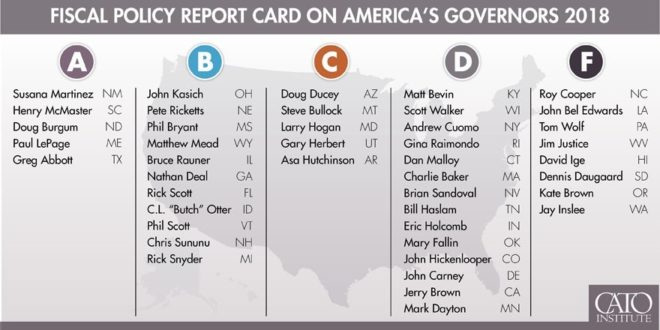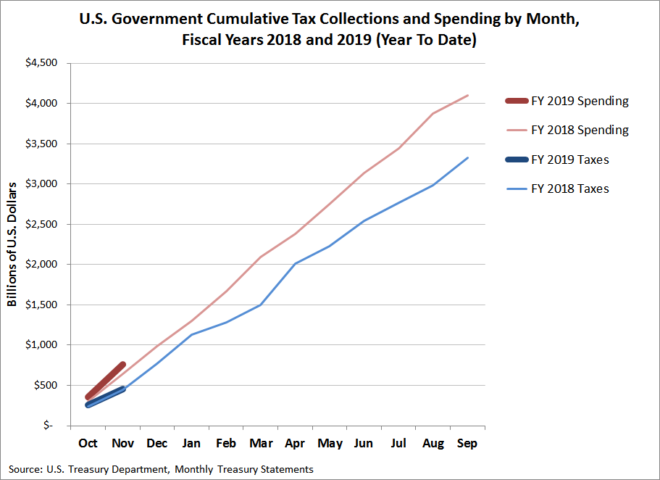Raymond J. March • Tuesday, January 8, 2019 •
In July 2017, the Food and Drug Administration enacted a comprehensive plan to regulate tobacco and nicotine products. The goal of this plain was “to better protect kids [from nicotine addiction] and significantly reduce tobacco-related disease and death.” Although most of the FDA’s efforts involved creating educational materials and bolstering warning labels, recent proposed regulatory changes have been described as a “historic crackdown” of the nicotine and tobacco products market.
The vast majority of the FDA’s “crackdown” occurred in the e-cigarette market, where the FDA has fined over 1,300 e-cigarette retailers, demanded five e-cigarette companies provide it with convincing plans on how they will prevent minors from using their products, and raiding one e-cigarette company’s headquarters to confiscate documents.
Samuel R. Staley • Tuesday, January 8, 2019 •
Viewers with more than a passing familiarity with Republican national politics over the past thirty years are likely to leave theaters with mixed feelings (at best) after seeing the Golden Globe award-winning movie Vice. The narrative film by Adam McKay (The Big Short, Talladega Nights, Anchorman 2) is a line-blurring, occasionally satirical look at the political career of former Vice President Dick Cheney and his rise to power. Released nationwide on Christmas Day, Vice is creative and, at times, artistically brilliant. The distortions in the narrative, however, are so partisan and propagandistic many will have trouble, as I did, appreciating the movie’s artistry.
I am no Dick Cheney fanboy. As a libertarian, large swaths of the Republican policy agenda fashioned and implemented by Dick Cheney and others are an anathema to my views on governance and the proper scope of political power. These disagreements include those squarely in the sights of Adam McKay’s scathing narrative: the dramatic expansion of executive power in the White House, the terrifying abuse of surveillance and torture as part of a national anti-terrorism campaign, misguided military adventurism that continues to kill hundreds of Americans and thousands of innocent civilians. I also largely agree that Cheney has been a principal architect of the military and intelligence Deep State and the expansion of state control at the expense of individual liberty. But McKay’s narrative crosses several lines in his exuberance to vilify him, even in a narrative film.
Craig Eyermann • Monday, January 7, 2019 •
The Democratic party assumed control of the U.S. House of Representatives on Thursday, and among the first actions that incoming House Speaker Nancy Pelosi sought to take to distinguish her leadership from that of the House’s previous management was to institute a “Pay As You Go” rule for new spending. Vox‘s Tara Golshan describes what Speaker Pelosi’s new “PAYGO” rule would mean:
House Democratic leaders want to institute a “pay as you go,” or PAYGO, rule for the next two years. The rule means any legislation increasing mandatory spending (like entitlement programs) or cutting taxes — and therefore increasing the deficit over the next 10 years — would have to be offset with budget cuts to mandatory spending or tax increases. The rule can only be waived with a majority vote.
Raymond J. March • Monday, January 7, 2019 •
In four months the Food and Drug Administration went from investigating whether e-cigarettes motivated teens to smoke to declaring teen vaping an “epidemic” where “all options are on the table” to prevent “addicting a generation of youth on nicotine.” What followed has been described as a “historic crackdown” of the e-cigarette industry.
This crackdown included fining over 1,300 retailers for allegedly selling vaping goods to minors, demanding five vaping companies provide the FDA “with robust plans on how they’ll convincingly address the widespread use of their products by minors,” and seizing records from e-cigarette industry leader Juul’s headquarters. The FDA has also proposed a list of heavy-handed regulations, including banning flavored e-juices, banning convenience stores from selling e-cigarettes, and requiring age-verification for online e-cigarette sales. Although these regulations are still in the proposal phase, many producers are preparing for dramatic changes to the e-cigarette market.
I’ve argued in a previous blog post that these regulations will likely cause considerable harm to those they are intended to help. Others agree. However, few have asked, Can the FDA actually prevent teens from vaping?
Craig Eyermann • Saturday, January 5, 2019 •
Now that 2018 is over, how did your state’s governor do on their fiscal policy report card?
If you want the details, and you should definitely check out your state governor’s report card to find out why they earned the grade they were given, please click over to the Cato Institute’s Fiscal Policy Report Card on America’s Governors 2018. However, if you want to see their overall grade, Chris Edwards’ reveals that just five of fifty earned an “A”, 11 earned a “B”, only 5 earned a “C” average, 14 were below average with a “D”, and eight flunked altogether.

The Cato Institute’s 2018 fiscal policy report card provides grades for 43 governors, where seven states have governors who have only been on the job for a handful of months and haven’t yet established enough of a track record to be evaluated. The 43 governors whose fiscal policies were evaluated were judged on their spending, revenue and tax rate-related proposals and actions, with a total of seven variables in all being considered.
The highest rated governor in Cato’s 2018 fiscal report card was Susanna Martinez of New Mexico and the lowest rated was Jay Inslee of Washington. Any governors looking to improve their grade, and their state government’s fiscal condition, should review not just their scores but also the evaluations of their top and bottom performing peers!
Vicki E. Murray-Alger • Friday, January 4, 2019 •
New Year’s Day marked the 156th anniversary of the Emancipation Proclamation, which guaranteed:
That on the 1st day of January, A.D. 1863, all persons held as slaves within any State or designated part of a State the people whereof shall then be in rebellion against the United States shall be then, thenceforward, and forever free…
On this day, Booker T. Washington serves as a shining example of the importance of freedom and education. As Pepperdine University Economics Professor Gary M. Galles explained in a recent Foundation for Economic Education article:
Robert Higgs • Friday, January 4, 2019 •
Historians are often rightly accused of carrying contemporary ideas and values back into the past and using them inappropriately to evaluate actors and institutions of bygone days. The presumption in this accusation is that historians know a lot about their own times and relatively little about former times. But such need not be the case.
I remember reading long ago a collection of essays by the distinguished political and intellectual historian of 16th and 17th century Britain J. H. Hexter. In the book’s introduction, Hexter notes how much he is at home in those remote times and how relatively ignorant and unaware he is of the times in which he was living. He simply had devoted much more time and effort to the long ago and far away than he had to informing himself about his own times and circumstances.
I often feel the same way, especially in regard to popular culture. When I hear people refer to contemporary actors, entertainers, and athletes, I often say to myself, Who are these people? Even more so for “celebrities,” people who have done nothing, but are famous for being famous. I’m pretty sure I know more about Grover Cleveland and his presidential administrations than I know about Donald Trump and his. And I have no doubt that I know more about the U.S. economy of the period 1865-1950 than I know about the current U.S. economy.
One really can live in the past. Indeed, it’s what historians are supposed to do.
K. Lloyd Billingsley • Thursday, January 3, 2019 •
During his last eight years in office, California governor Jerry Brown issued 283 commutations and 1,332 pardons. During his final weeks in office, the state Supreme Court denied seven of Brown’s clemency requests as an “abuse of power.” It was the first time the state’s high court had done so in more than half a century, and the rejections seem fully justified. The governor’s candidates included Kenny Lee, who murdered a cab driver, and fellow murderers Huan Nguyen, Joe Hernandez, Howard Ford, and Borey Ai. All had deprived their victims of the most basic right, the right to live.
In one of his last acts as governor, Brown ordered new testing of evidence in the case of Kevin Cooper, on death row for the slayings of Doug and Peggy Ryen, their 10-year-old daughter Jessica and neighbor Christopher Hughes in 1983. Former governor Arnold Schwarzenegger twice rejected Cooper’s petitions for clemency, and prosecutors oppose the new testing. There was no need for Brown to intervene in the case or commute the sentence of any murderer.
Craig Eyermann • Thursday, January 3, 2019 •
The U.S. government is getting off to a very bad start in its 2019 fiscal year. Although it is collecting record levels of revenues from taxes, it is somehow managing to increase its spending even more.

Why does the government have a budget deficit and a growing national debt problem? It’s the spending, stupid!
Raymond J. March • Thursday, January 3, 2019 •
A recent CBS News article notes the struggle many people with diabetes face trying to afford insulin they need to manage their blood glucose levels. In the last twenty years, insulin prices have increased over 700 percent, forcing many diabetics to choose between buying food, paying bills, or filling their prescriptions. Some are forced to ration their insulin, often leading to diabetic complications (and even death).
Tragically, many others find themselves in similar situations. Those who rely on EpiPens to avoid fatal allergic reactions have seen life-saving medication prices increase by nearly 500 percent from 2009 to 2016. Others with less urgent needs for prescriptions drugs haven’t fared much better. According to the 2017 Health of America Report, Blue Cross Blue Shield members have increased their drug spending by 73 percent from 2010 to 2017.
With over fifty percent U.S. citizens taking at least one prescription drug, millions are desperate for lower drug prices. Although politicians have answered their call for help, they are providing little relief.







